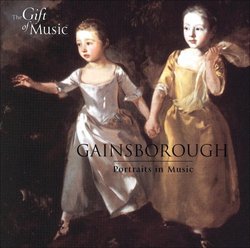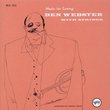| All Artists: Various Title: Gainsborough Members Wishing: 0 Total Copies: 0 Label: The Gift of Music Original Release Date: 1/1/2003 Re-Release Date: 3/1/2003 Genre: Classical Styles: Opera & Classical Vocal, Chamber Music, Forms & Genres, Concertos, Symphonies Number of Discs: 1 SwapaCD Credits: 1 UPC: 658592107128 |
Search - Various :: Gainsborough
 | Various Gainsborough Genre: Classical
Gainsborough Portraits in Music Thomas Gainsborough (1727-88) was an English painter of portraits and landscapes. His innovative and unique techniques made him one of the most remarkable artists of his time. This painting ... more » |
Larger Image |
CD Details
Synopsis
Product Description
Gainsborough Portraits in Music Thomas Gainsborough (1727-88) was an English painter of portraits and landscapes. His innovative and unique techniques made him one of the most remarkable artists of his time. This painting of his children chasing a butterfly exhibits many of the characteristics of his work: light and rapid brush strokes, a freedom of form which gives tremendous vitality to his typical full-length portraits, and a fanciful setting. His career began in Suffolk in the early 1750s, but he soon moved to fashionable Bath, and then eventually to London, where he had been elected a foundation member of the Royal Academy. His great rival in London was Sir Joshua Reynolds, but Gainsborough's style, methods and business acumen were always to differ from that of the Principal Painter to the King, not least because, as a more easy-going character, Gainsborough often felt that 'painting and punctuality mix like oil and vinegar'. Gainsborough's genius was never in question, however - even Reynolds recognised that Gainsborough's work was quite remarkable, praising 'his manner of forming all the parts of a picture together', and describing 'all those odd scratches and marks' that 'by a kind of magic, at a certain distance...seem to drop into their proper places'. Gainsborough's preferred subjects were always living people or living landscapes, and he had very little interest in the style of portraiture and paintings of his period which were filled with historical or classical allusions. Outside his painting, one of Gainsborough's principal interests was music. We have created this album of music from his time and later, which reflects the signs of early Romanticism to be found in his portrayal of people and of nature. The programme is punctuated with works by Handel, whose music Gainsborough would have often heard in London. Two opera overtures, 'Berenice' and 'Alcina' have a grand effect, and the famous 'Arrival of the Queen of Sheba' remains as popular and cheerful today as ever. Around these works we have assembled a series of slightly later musical portraits, since it is often true that pioneering styles and movements in the world of art are followed later in music. Our musical portraits from this later period range from Schubert's beloved 'Rosamunde', to whom he dedicated huge amounts of his musical life, writing and re-writing music for plays about her, to Beethoven and Haydn's 'Emperor', the former in guise of a concerto movement, the latter through the medium of the string quartet. Gainsborough may have known Haydn's music, and possibly something of Mozart, too, who had played in London as a child in the 1760s, and whose music was played and sung in England by his pupils and friends during the the 1770s and 1780s. Mozart's 'Figaro' is one of the most uplifting of musical portraits. As one of the greatest opera composers of all time, Mozart could bring a deft touch of characterisation to the musical style of his day, which, in an analogy to the advanced painting techniques of Gainsborough compared with his contemporaries, could in less capable hands, appear outwardly rigid and sterile. Mendelssohn's music is part of the classical tradition of Mozart and Beethoven, but his music is overlaid with a Romantic sensibility and love of nature: the parallels with Gainsborough's work are striking. His 'Scottish' symphony was composed after he had toured the British Isles as a young man. Haydn's 'London' symphony, while not a programmatic work, still captures, particularly in the 'Finale', the bustle and excitement of one of the world's greatest cities.
Similar CDs
| Intermission, Derek Bailey Unanswered Questions Genre: Jazz Label: BVHaast | |
| Runaways Best of the Runaways Genres: Pop, Rock, Metal Label: Polygram Records | |

 Track Listings (11) - Disc #1
Track Listings (11) - Disc #1

